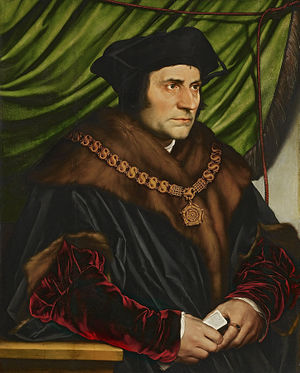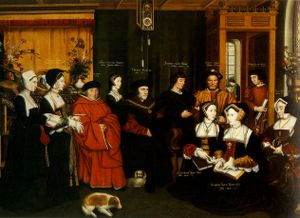Thomas More

Sir Thomas More (1478–1535), saint, statesman, scholar, and author, was an incarnation of El Morya, who had been Thomas Becket in a previous life. He served as Lord Chancellor of England under King Henry VIII, the reembodied Henry II. Once again they were given the choice to serve God’s will or man’s will.
More discharged his duties wisely and well, but was beheaded because he failed to support the king in his departure from the laws of the Church regarding his marriage to Ann Boleyn.
Vida temprana
Celebrado en nuestros días como el “hombre para todas las estaciones”, Sir Thomas More nació en 1478 en el corazón de Londres. Su padre, abogado y magistrado prominente, le proporcionó una educación excelente. A los dieciocho años salió de Oxford con un conocimiento esmerado de los clásicos y se consagró al estudio de la ley.
Joven todavía, Th omas era ya muy amigo de Erasmo, el eminente humanista holandés, y la estima que el rey Enrique VIII tenía por él iba en aumento, pues lo enviaba en misiones al extranjero. Prosiguiendo también sus intereses literarios, More fue aclamado como el primer escritor de prosa inglesa por la elegancia con que escribió la Vida de Ricardo III, documento histórico preciso que Shakespeare siguió literalmente al detalle.

La profunda devoción que Moro tenía por Dios hizo que en alguna ocasión considerara la vocación religiosa y practicara extraordinarias austeridades durante más de cuatro años, para poner a prueba su propia disciplina. Sin embargo, decidió casarse; su esposa y sus cuatro hijos serían su mayor alegría y su único consuelo en el futuro. Su famosa propiedad de Chelsea albergaba a toda la familia de Th omas, incluyendo a once nietos. Al paso de los años, la “pequeña Utopía” de Moro, como él la llamaba a menudo, se convirtió en un centro de aprendizaje y cultura, comparado por Erasmo con la “academia de Platón”— un hogar de buena voluntad al que se allegaban los hombres más sabios de la época, incluso el rey, en busca de consejo y consuelo. En Chelsea escribió la famosa obra llamada Utopía, aguda ponencia sobre la superfi cialidad de la vida inglesa y los vicios fl agrantes de la ley inglesa.
In 1529, Sir Thomas More was appointed by Henry VIII Lord Chancellor of England. Of him Erasmus wrote: “In serious matters no man's advice is more prized, while if the king wishes to recreate himself, no man’s conversation is gayer. Often there are deep and intricate matters that demand a grave and prudent judge. More unravels them in such a way that he satisfies both sides.”
In spite of many honors and achievements, More sought no man’s esteem. He remained sensitive to the needs of the common people by daily walking the back streets of London to inquire into the lives of the poor. And even as Lord Chancellor, it was his daily custom to enter the court of judges at Westminster Hall where his father sat, to kneel, and to ask his blessing.

Conflict with the king
Sir Thomas devoted himself to his duties with utmost zeal until Henry, desirous of but lacking a male heir to the throne, declared his marriage to Catherine of Aragon null and announced his intent to marry Ann Boleyn. Since the divorce was without Papal approval and directly opposed to the laws of the Church, More refused to support the king’s decision. He resigned his office and retired to Chelsea where, greatly concerned with the heresies of Luther’s revolt, he continued his writings in defense of the Catholic faith.
Without friends and without office, More and his family lived in abject poverty. Nevertheless, Henry had been insulted at the chancellor’s public disapproval of him. The king, therefore, sought to defame More and thus restore his royal image. When Sir Thomas clearly refused to give the oath of supremacy to Henry as head of the new Church of England, he was imprisoned in the dread Tower of London. Badgered by king’s lawyers, More staunchly refused to compromise the position of the Church but diplomatically avoided direct accusation of the king, thereby saving his life and remaining a testimony to Henry’s sinful injustice.
Finally, however, jealous enemies were encouraged by Henry to lie against him in the chancellor’s own court at Westminster. Charged and convicted of high treason, Thomas More was beheaded on Tower Hill in 1535. Kneeling before the executioner, he said, “I die the king’s loyal subject but God's first.”
Legacy
Sir Thomas More was beatified by the Roman Catholic Church in 1886 and canonized in 1935.
More’s most famous work, Utopia, is an attempt to depict an ideal society, one in which men live in harmony under the holy will of the Most High God.
The motion picture based on the play by Robert Bolt, A Man For All Seasons, is the story of the life of Sir Thomas More.
An ironic footnote to this episode is that in 1538 Henry VIII had the shrine of Saint Thomas Becket broken to pieces. After so many centuries he had never forgiven Becket. Henry ordered Becket’s name erased from the prayer books and prohibited any images of Becket in England.
Sources
El Morya, The Chela and the Path: Keys to Soul Mastery in the Aquarian Age.
Elizabeth Clare Prophet, February 17, 1990.
